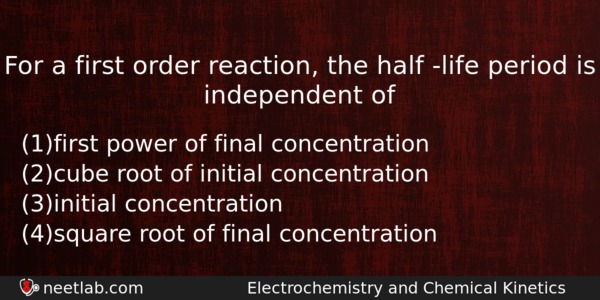| ⇦ | 
| ⇨ |
For a first order reaction, the half -life period is independent of
Options
(a) first power of final concentration
(b) cube root of initial concentration
(c) initial concentration
(d) square root of final concentration
Correct Answer:
initial concentration
Explanation:
No explanation available. Be the first to write the explanation for this question by commenting below.
Related Questions: - The property of crystalline solid is not
- The basicity of aniline is weaker in comparison to that of mathyl amine due to
- The temperature, at which heavy water has maximum density is
- Which of the following lanthanide is commonly used
- The geometry of Ni(CO)₄ and Ni(PPh₃)₂Cl₂ are
Topics: Electrochemistry and Chemical Kinetics
(87)
Subject: Chemistry
(2512)
Important MCQs Based on Medical Entrance Examinations To Improve Your NEET Score
- The property of crystalline solid is not
- The basicity of aniline is weaker in comparison to that of mathyl amine due to
- The temperature, at which heavy water has maximum density is
- Which of the following lanthanide is commonly used
- The geometry of Ni(CO)₄ and Ni(PPh₃)₂Cl₂ are
Topics: Electrochemistry and Chemical Kinetics (87)
Subject: Chemistry (2512)
Important MCQs Based on Medical Entrance Examinations To Improve Your NEET Score
18000+ students are using NEETLab to improve their score. What about you?
Solve Previous Year MCQs, Mock Tests, Topicwise Practice Tests, Identify Weak Topics, Formula Flash cards and much more is available in NEETLab Android App to improve your NEET score.
Share this page with your friends

Leave a Reply